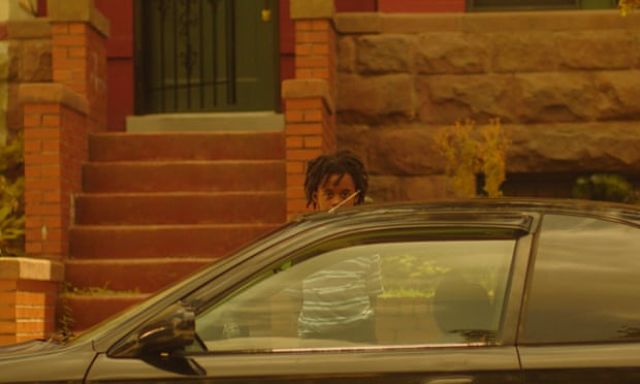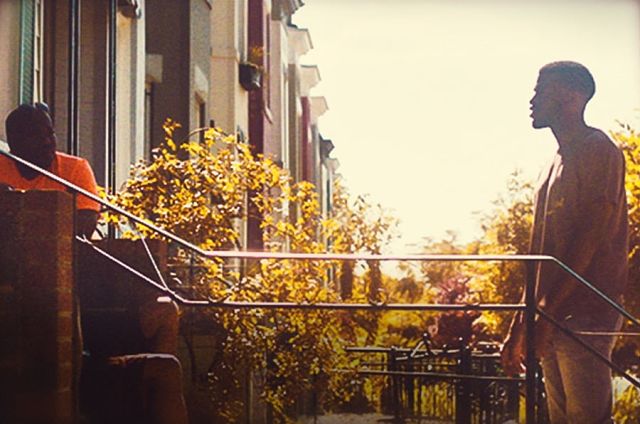Tadias Magazine
By Tadias Staff
Updated: September 21st, 2020
New York (TADIAS) — Merawi Gerima’s timely debut film Residue, is shining a critical spotlight on the adverse impact of gentrification on the local population in his hometown of Washington, D.C.
Coming in the middle of the largest post-civil rights movement, the film, which was screened this month at the 2020 Venice Film Festival and is now streaming on Netflix, has been greeted with great reviews.
“Merawi Gerima makes a stunning feature debut with “Residue,” a moving homage to the Northeast Washington neighborhood where he grew up,” declared The Washington Post in a review titled “Washington-born Filmmaker’s ‘Residue’ is a Deeply Personal Look at Black Identity and the Role of Art.”
The Guardian enthused: “A visually striking and timely film from first-time writer-director Merawi Gerima sees a film-maker returning to an unrecognisable DC neighbourhood. Residue is a fleeting and haunting lament for what is lost to gentrification, and other tolls on black life in America. But at the same, it’s exhilarating and monumental, laced with the sensation that we’re discovering a bold and sensitive new voice. Writer and director Merawi Gerima’s debut, released by Ava DuVernay’s independent film collective Array, tells a prodigal son story, about a man returning to his old stomping grounds. And in that story, Gerima experiments with performance and vérité, intimate narrative and poetic abstractions. His artistry is thoughtful. But more than anything, it’s emotional.”
For Merawi, the movie is essentially about home and a loss of the sense of belonging. “Residue is just about this neighborhood which I grew up in, which I remember fondly,” he said in an interview with Variety Magazine. “Trying to make sense of the distance between where I have ended up, and where they are. Because it’s vast. It’s not about gentrification in a specific sense.” He added: “It’s about a very specific perspective on this thing. On this all-encompassing battle that Black people face all over the world.”

“Residue, a fleeting and haunting lament for what is lost to gentrification.” – The Guardian (Photograph: Array)

Merawi Gerima’s new film is “a frank look at Gerima’s hometown, Washington, D.C., and the rate at which gentrification has transformed the city. The meta-tale follows Jay (magnetic newcomer Obinna Nwachukwu), a D.C.–born filmmaker who returns after finishing college in L.A.” – Vanity Fair. (Photo: Obinna Nwachukwu, right, in ‘Residue’/Array Releasing/Netflix)
According to Media Play News Residue was the only American movie to be featured on the sidelines of this year’s Venice Film Festival at Venice Days, “which pulled off the first major in-person film event since the COVID-19 pandemic forced many to go online, including Cannes. This followed its world premiere at the Slamdance Film Festival, where it took home the festival’s Audience Award for Best Narrative Feature.”
In a review released this week The New York Times notes that new film by Merawi, who is the son of Haile Gerima, “reveals a directorial voice as distinctive as that of his father.” NYT adds that the younger Gerima’s “challenging, engrossing filmmaking style is measured, simultaneously realistic and impressionistic. What’s out of the frame is often as important, if not more important, than what’s in the frame. As when Jay, climbing out of his basement in the dead of night, sees an old buddy passing by; through the grate of a fence they have a fraught conversation, made more so by the sight of the blue lights of an unseen police car bouncing off their faces. In another scene, Jay walks through the woods with a friend, Dion (Jamal Graham). They reminisce about old times amid this greenery, but it’s soon clear that he and Dion are actually in the visiting room of a jail, and that the restful environment is in Jay’s imagination.”
As Vanity Fair reminds us “Haile Gerima, the legendary Ethiopian director made two feature films before graduating from UCLA in 1976. Forty years later, his son, Merawi Gerima, found himself in film school at USC, with the same dreams of finishing a feature before exiting into the real world.”
“None of his teachers knew how he did it,” Gerima said of his father. “He shot two films before he had to give the camera back, edited the thesis by day, and then Harvest by night.” For Gerima, whose mother is the award-winning director Shirikiana Aina, completing a film before graduating was an urgent, deeply rooted goal. “It was my own personal kind of challenge,” he said.
Speaking about the rapid gentrification of Washington D.C. Merawi shares in his Vanity Fair interview that: “It was too much for my system to take,” adding “I was going down this dark path of pure anger with no outlet. The powerlessness was overwhelming, so I started writing [Residue] as a way to find something to grab onto that could make me feel like I had a way to affect the fate of my community.”
—